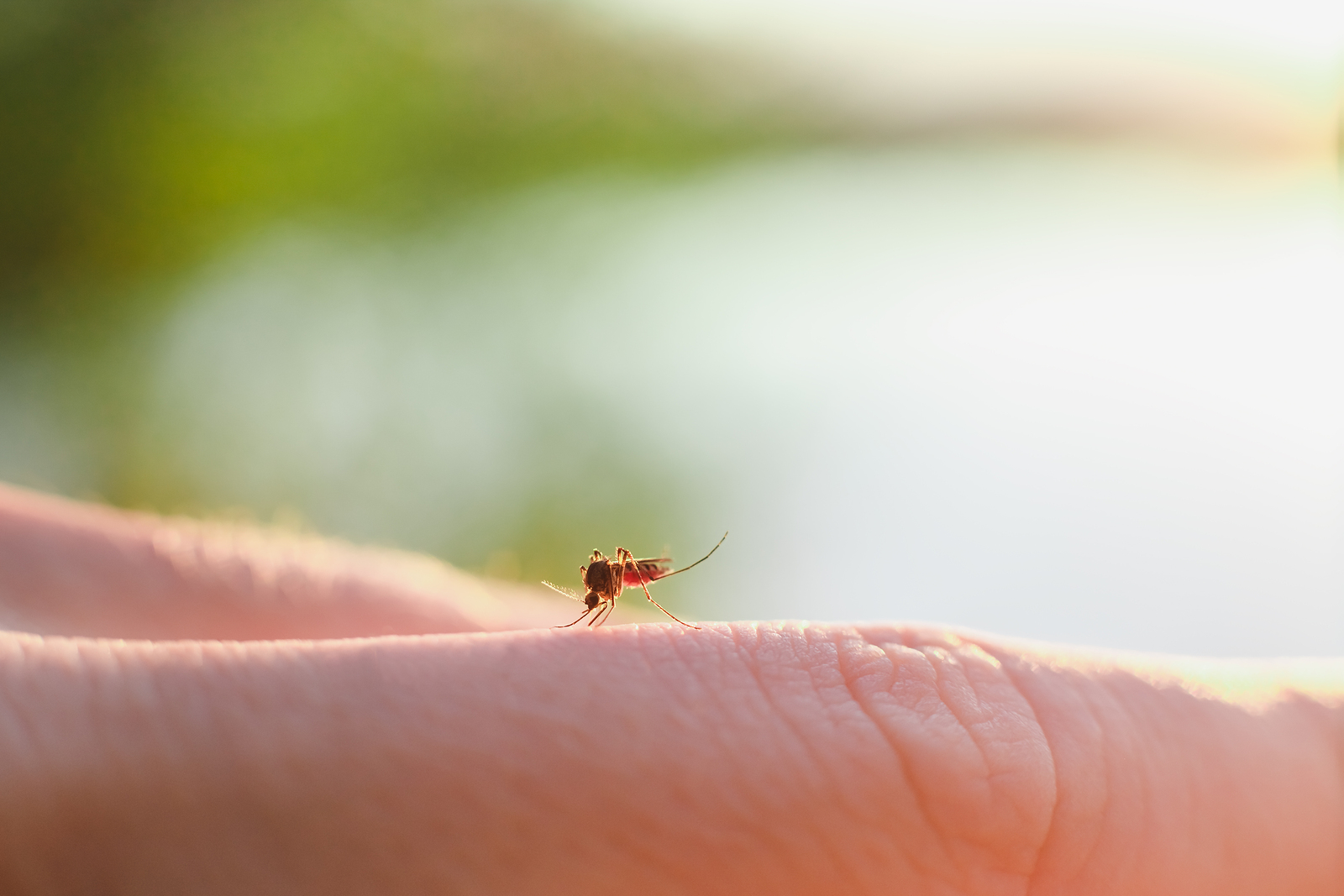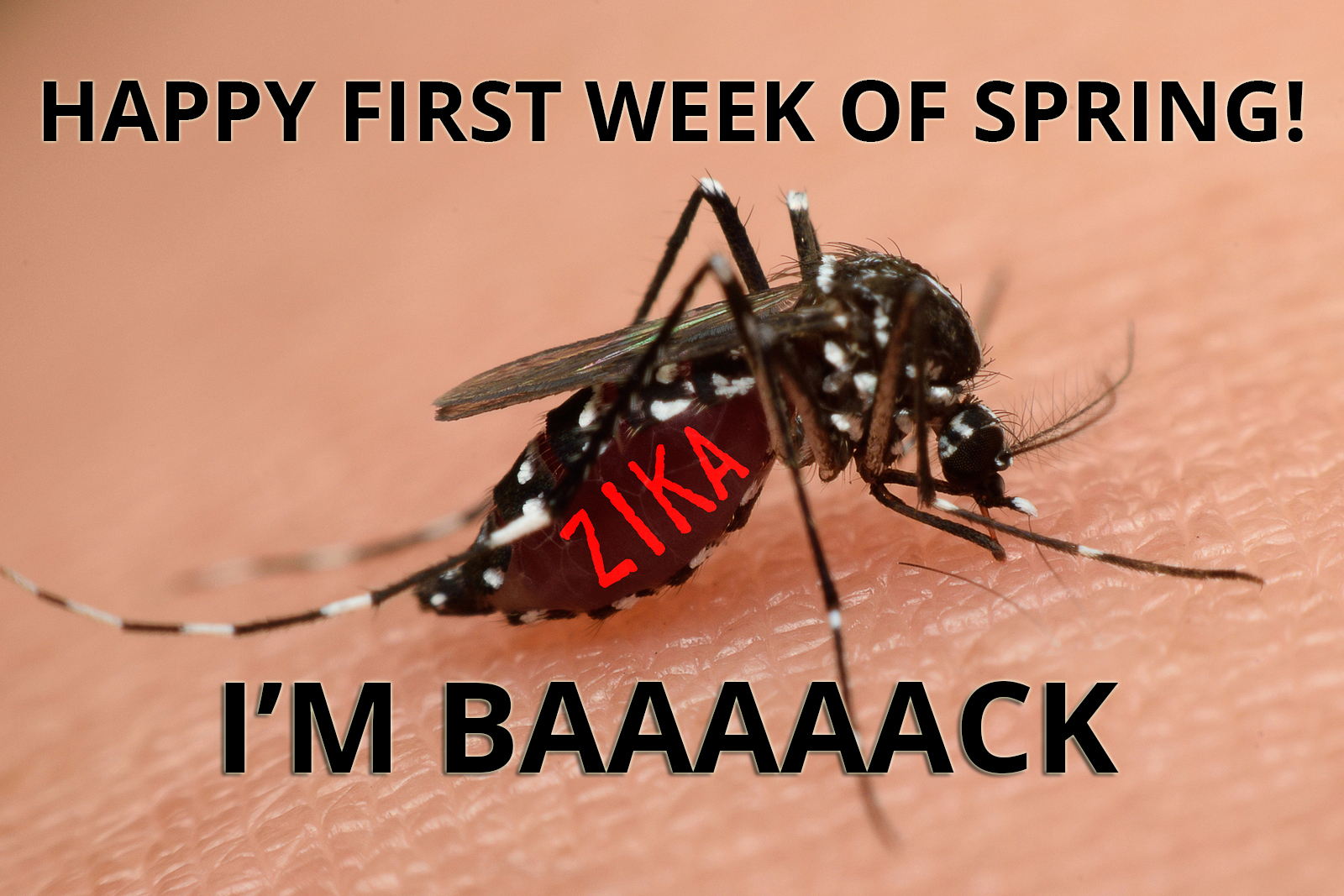READY TO GET STARTED?
REQUEST A FREE ESTIMATE
Fill out the form below or call (888) 466-7849 for a free, no-obligation estimate.

The South is known for many things like warm weather, sweet tea, and southern hospitality. Unfortunately, the south is also known for another thing – mosquitoes! Mosquitoes thrive in warm, humid climates like we have here in the southern United States. As the weather warms, mosquito season begins and peaks in the mid-summer months. Mosquitoes can breed in less than 1 inch of water so the South offers them a multitude of habitats to expand their populations.
Mosquito bites cause irritation and itching of the skin. Besides this nuisance, mosquitoes can also transmit diseases that can threaten the health of both humans and animals. Here are some of the most common diseases that can be spread by mosquitoes:
Now that you know some of the diseases you can contract from mosquitoes what can you do to prevent them? Avoiding mosquito bites is the #1 way to prevent all of the diseases mentioned above. Check out these tips to avoid mosquito bites and help keep them away from yourself and your home.

Mosquitoes are known carriers of several viruses, transmitting disease and parasites to people and animals that come in contact with them via painful bites. While some of these diseases don’t pose serious health risks, others can be deadly (over one million people die each year from mosquito-borne diseases, according to the AMCA!). Here are 3 common mosquito diseases you should be cautious of this summer:
First discovered in 1947, Zika, a mosquito-borne virus, originated in Uganda, Africa. Shortly after, outbreaks of Zika were detected throughout tropical areas in Africa, Southeast Asia, and the Pacific Islands, according to the CDC. Now, mosquitoes carrying Zika have been identified in many countries, including the U.S.
Primarily transmitted by the Aedes species, infected mosquitoes can spread Zika to humans and animals through bites. These mosquitoes are active during daytime and evening hours. Zika can also be sexually transmitted from one infected partner to another, from pregnant women to unborn babies, and through blood transfusions.
Common symptom of Zika include rash, fever, joint and muscle pain, headache, and/or red eyes and can last for up to a week, but many infected won’t show any symptoms at all. Zika is dangerous specifically for pregnant women as it can cause birth defects, a condition called Microcephaly, in fetuses. This can cause brain and eye defects, hearing deficits, and impair growth.
Because there’s currently no vaccine to treat and/or cure Zika, the best way to protect yourself is by preventing mosquito bites. Keep arms and legs covered in loose, light-colored clothing when outdoors and use insect repellent. Repair or replace missing or damaged window and door screens at home and keep them closed as often as possible. Control mosquito populations around your home by getting rid of adult mosquitoes as well as reducing mosquito reproduction with home mosquito treatments from a licensed pest control company. Most companies offer eco-friendly mosquito treatment options that are family and pet-friendly, if having your yard treated with chemicals is a concern. If pregnant, the CDC advises to avoid traveling to countries with known Zika outbreaks – see the list here – and refrain from unprotected sex.
Check with your doctor to get tested. To minimize symptoms, drink lots of fluids, get plenty of rest, reduce fever or pain with over-the-counter pain medicines (avoid aspirin), and prevent additional mosquito bites. If you’re bitten by a mosquito once infected, you can pass Zika to other mosquitoes, who will then infect someone else – increasing the spread of Zika. If you’re pregnant and suspect you have Zika, contact your physician immediately.
The first occurrences of West Nile in the U.S emerged in New York in 1999 with 62 confirmed cases and 7 human deaths, according to the AMCA. West Nile virus is a mosquito-borne virus carried by many different mosquitoes, one of the most common being the Culex species.
West Nile is most often transferred from birds to mosquitoes, and then from mosquitoes to humans and animals through bites.
Symptoms may develop 3-14 days after bitten. Typically only 20% of people infected with West Nile virus will experience symptoms which include headache, body aches, and fever and usually last a week or less. Rarely, the virus develops into West Nile encephalitis which can cause high fever, neck stiffness, disorientation, coma, muscle weakness, convulsions, paralysis, and sometimes death. This is most common in people over the age of 50.
Like Zika, there is no vaccine for West Nile virus. Prevent the virus by preventing mosquito bites.
See your doctor. A blood test can determine if you’re infected with West Nile virus. If symptoms are severe, hospitalization may be necessary.
Dengue, a mosquito-borne virus, is the leading cause of illness and death in the tropics and subtropics according to the CDC (400 million people infected each year). While it rarely occurs in the U.S., it’s important to be aware of dengue while traveling to popular tourist destinations like Puerto Rico, parts of Central and South America, Southeast Asia, and the Pacific islands. Dengue is carried by the Aedes aegypti and Aedes albopictus mosquito species which are found throughout the world.
Mosquitoes carrying dengue infect humans through bites and infected humans can infect other mosquitoes, when bitten.
Most cases of dengue in the U.S. were acquired through travel abroad. Symptoms include severe headache, high fever, eye pain, joint pain, muscle pain, and rash. Severe cases can cause stomach pain, vomiting, difficulty breathing, and bleeding from gums and/or nose.
Mosquito bite prevention is key when traveling to areas with known dengue outbreaks as there is no vaccine for dengue or medications to treat it. It’s especially critical for people with dengue to avoid mosquito bites so the disease isn’t spread from person to another mosquito.
If symptoms are mild, lots of rest and fluids are recommended. For more severe symptoms, contact your health care provider immediately.

It’s the first official week of Spring (aka Mosquito Season)! Time to start thinking about mosquito prevention.
The risk of contracting mosquito-borne Zika virus in the U.S. is at an all-time high, specifically dangerous for pregnant women or those trying to conceive as the virus can cause serious birth defects. According to the CDC, 222 cases of Zika were reported as of March 15, 2017, acquired through local mosquito-borne transmission in Florida and Texas. And because there’s currently no vaccine for Zika, the only way to prevent it is with mosquito bite prevention. Here’s how you can minimize your risk and limit the spread of Zika.
The best way to prevent mosquito bites when spending time outside this spring and summer is to reduce mosquito populations around your home with a mosquito control program. Usually consisting of monthly treatments, a professional mosquito control program includes:

It’s the first official week of Spring (aka Mosquito Season)! Time to start thinking about mosquito prevention.
The risk of contracting mosquito-borne Zika virus in the U.S. is at an all-time high, specifically dangerous for pregnant women or those trying to conceive as the virus can cause serious birth defects. According to the CDC, 222 cases of Zika were reported as of March 15, 2017, acquired through local mosquito-borne transmission in Florida and Texas. And because there’s currently no vaccine for Zika, the only way to prevent it is with mosquito bite prevention. Here’s how you can minimize your risk and limit the spread of Zika.
The best way to prevent mosquito bites when spending time outside this spring and summer is to reduce mosquito populations around your home with a mosquito control program. Usually consisting of monthly treatments, a professional mosquito control program includes:

Improving the health of your home offers major benefits to your family. Reduce waste, minimize exposure to chemicals & toxins, breathe healthier, lower your risk for sickness, and improve the overall health of your environment with these 10 healthy home tips.
Most plastics contain chemicals that are added for functionality. Some of these chemicals have been proven to be toxic. It has also been proven that some of these chemicals can leach into food and liquids that are contained in the plastic. While it is unlikely that one can completely avoid plastic altogether, it is important to limit its use with items that are likely to come in contact with the mouth. Most plastics are marked with numbers which indicate the type of plastic used to make the item. Plastics marked with #3 (or “PVC”) contain a toxic chemical that was recently banned in 2009. Plastics marked with #7 (or “PC”) are usually clear and rigid (e.g. food containers and water bottles). These containers have BPA which can leach into food and water that is in the containers. It is best to avoid plastics with these numbers if at all possible. Glass and ceramic containers are a much healthier option than plastic. However, if glass or ceramic are not available, plastics marked with a #1, 2, 4, or 5 do not contain BPA and are much safer choices than the other plastics mentioned above. Don’t heat plastic containers in the microwave as this releases the chemicals in the plastic. If you can, wash them by hand; if you do put them in the dishwasher, put them on the top shelf as the water is cooler there.
Most canned foods are lined with the same chemical, BPA, that was mentioned in tip #1. Try using fresh or frozen foods instead of canned when possible. When buying fresh foods, especially vegetables, try to buy organic as these foods are grown with less pesticides. Check to make sure your salt is iodized; it helps to maintain thyroid function. Check the mercury content of fish; some fish are considered mercury-rich. It is best to avoid these fish as much as possible, especially if you are pregnant. Use a filter when drinking tap water to remove contaminants and use a stainless steel, reusable water bottle.
Avoid non-stick cookware and kitchen utensils if at all possible. If you must use them, try not to overheat them as this converts the toxic particles into gas form and allows them to release into your food. Try to use stainless steel or cast iron cookware and wooden or stainless steel utensils instead.
Many cleaning products contain chemicals that have been proven to lead to asthma, cancer, and other health issues. Check the ingredients on your cleaning products and opt for “green” products instead as these contain less chemicals than traditional cleaners. Most of these cleaners are marked with a label indicating they are “green certified.” If you must use traditional cleaners, check the label for diluting instructions and use the least amount as necessary to do the job. Consider using natural alternatives to cleaners, like vinegar diluted with water and baking soda, which is a great alternative to window cleaner. Mix baking soda and water to form a paste which can be used to clean ovens and toilets. Dilute vinegar in a bucket of water to mop floors. Green is the way to go when it comes to pesticides, as well. The saliva, feces, and shedding body parts of cockroaches have been proven to trigger both allergies and asthma. A green pest control program gets rid of pests while maintaining the lowest environmental impact possible, and it’s pet and family-friendly! Mosquitoes transmit a multitude of diseases like Zika, West Nile, malaria, dengue and more. Reduce mosquito bites and lower your risk with mosquito bite prevention and a green mosquito control program – guaranteed to reduce the number of mosquitoes and mosquito breeding sites around your home without harsh chemicals.
Allergies and asthma can also be triggered by pet dander, dust, and other irritants commonly found in your home. Think of your home as an organism and your heating & cooling systems as the breathing mechanisms. The system supplies conditioned air but at the same time it pulls that same air back into the return. This means that the air is being constantly recycled and is picking up particulates from pets, cleaning products and what you cooked for dinner. It’s no wonder it’s polluted. The first step to getting rid of the dust in your home is to dust and vacuum often. Vacuum cleaners with HEPA filters are now available that trap and collect more dust and irritants than a regular vacuum cleaner. Follow this up with wet mopping your floors often, as well. Consider investing in an air purifier for your home that’s installed directly onto your current heating and cooling system, making the air inside your home cleaner, fresher and healthier for the whole family.
Check the age of your home. If it was built prior to 1978 there is a good chance the paint contains lead. Repainting with low VOC paints can reduce your exposure to toxic lead. Does your furniture contain foam? Many foam stuffed items such as mattresses are treated with toxic flame retardants. Check the items carefully to make sure the foam is not exposed and repair or replace if they are. Check your light bulbs. Compact fluorescent light bulbs contain toxic mercury which can be harmful to you and your family. Handle them with care, especially when disposing of them. Wooden furniture such as picnic tables and swing sets, as well as wooden decking on the exterior of your home can contain arsenic if built before 2005. Replace with items built after 2005 or seal them to reduce your exposure. Check your crawl spaces in your home. One of the best ways to increase energy efficiency, prevent mold growth, and control pests is to enclose your crawl space. This could save you up to 18% on utility bills! In addition to the crawl space, you should also check the insulation in your attic to see if it’s adequate. If not, consider adding a green insulation product like TAP Insulation which can reduce the amount of energy needed to heat and cool your home, conserving energy while significantly reducing energy bills.
Since we don’t always know what makes up the fragrances of our personal products, consider buying fragrance-free. Does your toothpaste contain fluoride? Fluoride is toxic to children under the age of 2. Use fluoride-free toothpaste for your kids. Check your shower curtain; if it’s vinyl, throw it out. And regardless of the material it’s made of, shower curtains should be left outside for several days before installing in your home. Avoid using products that aren’t absolutely necessary such as hair spray, detanglers, dryer sheets, and fabric softener. Save money while reducing your family’s exposure to toxic chemicals!
Many pests can enter your home in ways that you would never think of. Seal any openings that could be potential pest entry points – utility openings where wires or pipes come into the foundation and areas around gas meters, dryer vents, and outdoor faucets. You can use caulk, expandable foam, copper mesh, or cement to seal these openings. Examine doors and windows. Be sure to seal any gaps and cracks around windows and doors that would allow pests to enter the home. You can use weather stripping or caulk to seal these problem areas. You can also fit the bottoms of your doors, including your garage doors, with rubber seals. Weather stripping can also be used to seal the bottoms of sliding glass doors. Be sure to examine your screens on doors and windows, as well. Repair any rips/tears that can be fixed and replace the screens that can’t be fixed. If you have a chimney, make sure you install a chimney cap to keep out birds, bats, and other wildlife. You can also install wire mesh over attic vents to keep out bats, squirrels, and rodents. If you have a woodpile outside, make sure to keep it at least 20 feet from the exterior of your home and elevate the woodpile if possible. Cut back overgrown landscaping 1-2 feet so they are not touching the exterior of your home. You should be able to walk the entire perimeter of your house without touching any landscaping. Lighting also attracts pests, especially around windows and doors; using sodium vapor lighting can help.
Hand washing is easy to do and it’s one of the most effective ways to prevent the spread of many types of infection and illness. Help stop the spread of germs by washing your hands often, especially during key times, such as before, during, and after preparing food; before eating food; before and after caring for someone who is sick; before and after treating a cut or wound; after using the bathroom; after changing diapers; after blowing your nose, coughing or sneezing; after touching an animal, animal food, or animal waste; and after touching garbage. If soap and water are not available, use an alcohol-based hand sanitizer that contains at least 60% alcohol.
Keep a distance between flammable objects (papers, curtains, plastics, etc.) and fire sources (oven, stove top, portable heater, etc.). Keep electrical appliances wrapped and away from water. Install smoke detectors, check them regularly, and replace the batteries at least once a year. Avoid overloading outlets and extension cords. Keep fire extinguishers handy and know how to use them.